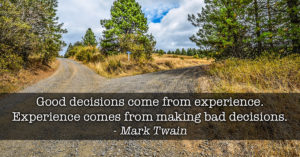Decisions! Decisions! Decisions!

From the moment you wake up each morning, you’re faced with decisions. Should I snooze my alarm one more time, or do I get up? Do I eat a healthy breakfast, or do I go for coffee and skip it? Do I add emails to my marketing funnel, or do I watch television?
It may seem as if you have too many decisions to make to ever do a good job at it. But the truth is if you have a plan before you need to make choices, and know what you want, you can do better at making decisions. And you can make them effortlessly and faster.
Know Who You Are
It might seem silly that you need to know who you are to make decisions about your life, mind, body, and spirit, but it really does help. For example, if you have guiding morals, values and principles that define you, looking to those will help you make much better decisions. This is one of the reasons good businesses put so much effort into defining their core values.
Define the Problem
When you understand your own values, then you can work toward defining the problem. Sometimes it can help to turn the problem into a question. What will change today if I hit the snooze button? What are my goals? All of this will help you determine what the real problem is and the right solution to choose.
Determine the Ideal Result
It can often help to make your choices based on the result that will occur from the decision. For example, compare the effect of getting up late versus the result of getting up early. When you know how your choice impacts everything else, you can make better decisions to ensure that you’re creating the impact you desire.
Gather Relevant Information
When you know what the problem is, and you know the results you’re trying to achieve, it’s going to be easier to make a good choice. Do your research to find out all the relevant information you need to know. Remember that sometimes you don’t even know what questions to ask. That just means you’ll have to do research based on where you are in your own problem-solving, in order to make better choices.
Note the Alternatives
Make a list of the decisions that you can make so that you have an idea of all the alternatives you have. For example, sometimes the choice isn’t just about getting up late, sometimes the option is between finishing something on time or choosing to do it later so that you can get another benefit. You might be sick and need some more sleep today, for example, so the choice might not always be as simple as you may think going in.
Weigh the Evidence
When you have a list of alternatives, you can note the probable impact of making those choices and then weigh the evidence to find out if that’s what you want to do. By determining if the facts you found are accurate or not, you can help yourself make even better decisions based on facts.
Choose One Choice
Once you’ve narrowed down the choices, make your decision, and then actively choose it. You don’t want to go back and forth on this. Make a final choice based on the evidence and what you know right now. Realize that wavering here is just going to set you back.
Act on The Choice
Now that you know what your choice is, act on it straight away. Don’t wait around. For example, if you’ve decided that you’re going to refinance your mortgage because you’ve determined it’s an excellent financial choice, don’t wait. Start the actions needed to implement your decision now.
Review and Adjust as Needed
Depending on what you’re doing, you can also analyse and review your choices to find out if you made the right choice. Some decisions can be changed once further evidence is presented. Others you’ll just have to learn from so you can do better next time.
When you know what type of results you’re looking for in your life, whether personal or work-related, it’s a lot simpler to make the right choices. You can simply look at the impact each decision you have made creates, and then choose from there.
 If the reason why you are struggling with making difficult decisions is that you doubt yourself, (and lots of people do!) check out my quick course on Overcoming Self-Doubt and Finding A Positive Outlook On Life at http://kmginfo.com/go/selfdoubt
If the reason why you are struggling with making difficult decisions is that you doubt yourself, (and lots of people do!) check out my quick course on Overcoming Self-Doubt and Finding A Positive Outlook On Life at http://kmginfo.com/go/selfdoubt
That may be all you need to move forward making better decisions in your business and your life.

 Here’s a quick checklist that will help you decide if you are a motivational leader…
Here’s a quick checklist that will help you decide if you are a motivational leader…



 One of the most powerful ways to grow success for you or your business in this new year is to focus on developing and maintaining a mindset of gratitude.
One of the most powerful ways to grow success for you or your business in this new year is to focus on developing and maintaining a mindset of gratitude. Let’s face it: we all have days where the circumstances just try your patience. With deadlines to meet and more and more interruptions and demands placed upon you, everything can just grow out of all proportion.
Let’s face it: we all have days where the circumstances just try your patience. With deadlines to meet and more and more interruptions and demands placed upon you, everything can just grow out of all proportion. 






